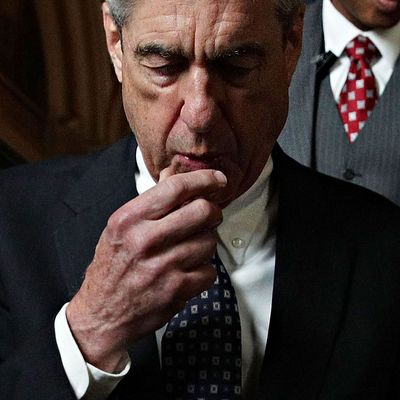
In late 2015, the British spy agency GCHQ, and then other Western intelligence agencies, learned of suspicious interactions between Russian agents and Donald Trump’s inner circle. By the summer of 2016, James Comey testified Friday, the FBI had opened a counterintelligence probe into four people in the Trump campaign. In May 2017, Robert Mueller was appointed to investigate Russian election interference.
These dates give us some sense of the scale and timing of the unfolding mystery. It took about a year and a half from the first indications of nefarious ties between Trump and Russia to the beginning of Mueller’s investigation. And it has taken about another year and a half from that point to last week, when Mueller filed sentencing recommendations for Michael Flynn, Paul Manafort, and Michael Cohen.
Reporters and commentators have begun saying Mueller’s probe is reaching its final stages. But given that Mueller’s operation is utterly airtight, this conclusion is almost certainly a matter of speculation, which has gained wide acceptance through repetition. Nobody actually knows if the probe is almost over. The gap between what Mueller has produced in public and what may be yet to come remains vast.
White House press secretary Sarah Huckabee Sanders somehow managed to keep a straight face when she told reporters that the Manafort filing “says absolutely nothing about the president.” The claim is technically correct because the filing contains line after line of redacted charges. For all the outward signs of movement, legal analysts have been left scrutinizing what small scraps of information Manafort has allowed into the public record for signs of where he is heading.
One of those scraps is a revelation from the sentencing memo of Michael Cohen, who was approached by a Russian agent in 2015 about a business deal. This nugget seemed to move back the timeline of Trump’s entanglement with Moscow. But public reporting has already provided a much richer narrative. Russian intelligence has been sniffing around Trump since at least 1987. Over the last decade, Trump has grown increasingly reliant on Russian investment, which is a leverage tool used by Moscow. It was in July 2015, before any of this reached the radars of Western intelligence or law enforcement, the Russian spy Maria Butina asked Donald Trump in a public forum if he would agree to lift sanctions on her country. Trump explained that yes, he would, because Vladimir Putin had little respect for Obama, and Trump would restore this respect and lift the sanctions:
The running total of Trump staffers and cronies who were approached by Russians during the campaign has grown to 14. It was common knowledge within the Trump campaign that Russia was working on Trump’s behalf. Trump openly asked for Russian help finding more stolen emails from his opponent, and they obliged immediately.
There remains a vast chasm between what has been reported in the news media — hell, what has even transpired in plain sight — and what Mueller has been able to demonstrate in a court of law. We still don’t know how much of this chasm will ever be closed. It’s possible the trail of inquiry will stop at the refusal of people like Roger Stone and Paul Manafort to talk. But prosecuting even a single person, let alone a large conspiracy, can take a lot of time. It’s also possible there remains a long way to go. Trump’s lawyers were promising the inquiry would be over by Thanksgiving — of last year! Do we have any real reason to believe it won’t still be going by this time next year?






























